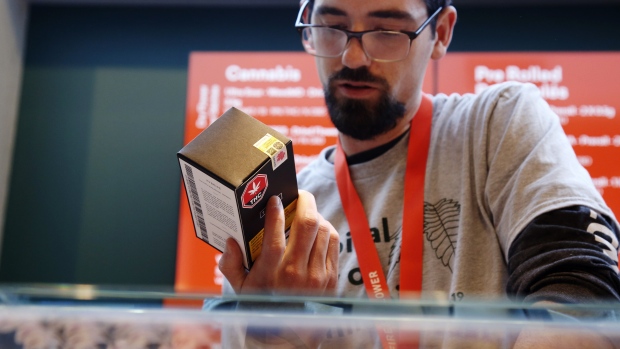Apr 12, 2019
Retailers give cold shoulder to Ontario's revised pot shop plans

Canadian cannabis retailers are giving the cold shoulder to Ontario’s revised plans to pre-qualify applications for future pot shop licences, citing concerns that they still don’t know when the province will allow for more store openings.
In its inaugural budget Thursday, Doug Ford’s government unveiled plans to introduce a variety of measures to vet applicants for future legal cannabis stores. They include requiring applicants to provide a standing letter of credit, disclosing financial information, criminal background checks and any details on lease or ownership interests for potential store locations.
But the announcement stopped short of providing details on when the province will lift its 25-licence limit, or what would assuage the government’s complaints of inadequate supply levels in the country.
“This announcement really says nothing,” said Trevor Fencott, chief executive officer at Fire and Flower Inc., in a phone interview with BNN Bloomberg. “What’s the point of pre-qualifying if you don’t have any commercial visibility on when the market is going to open up?”
Opening more retail locations will likely factor heavily into the future of Ontario’s budding cannabis industry, which has yet to really take off. Amid the slow roll-out of legal cannabis stores and initially limiting sales to the provincially-run Ontario Cannabis Store (OCS) website, Ontarians only spent $181 million on cannabis last year, second-most in the country behind Alberta, whose residents spent $216 million, according to a recent report by BDS Analytics. However, Ontario is expected to eventually lead the country in legal pot sales, with US$1.8 billion estimated to be spent by 2024, while Alberta should come in at $941 million by then, BDS added.
Fencott, whose Fire and Flower is working with two of Ontario’s cannabis lottery licence winners in Kingston, Ont. and Ottawa, said the province should allow retailers to build out stores and have regulators inspect them so they’re ready to open as soon as licences become available.
“In our view, it would only make sense to make businesses make decisions based on the risk they’re prepared to assume,” Fencott added.
- Ontario to vet future pot shop licence applicants in bid to combat black market
- Provinces scale back cannabis-related revenue estimates amid sluggish start
- Ontario finance minister blasts Trudeau’s cannabis rollout ‘blunder’
RELATED
Ontario Finance Minister Vic Fedeli has blamed the federal government for the supply issues that have been plaguing the country’s recreational marijuana market.
“The moment we know that the federal government has allowed more supply in the marketplace, we’ll grab as much as we can and we’ll continue to put more licences out,” Fedeli told BNN Bloomberg’s Greg Bonnell on Thursday after announcing the budget. “We want to have an open system; we want to have as many stores open as the market can bear.”
An Ontario government official declined to specify to BNN Bloomberg on Thursday how much supply needs to be delivered to the OCS, the province’s wholesale provider to retailers, before more licences will be up for grabs.
However, people familiar with the government’s plans say that the OCS requires cannabis producers to regularly meet purchase order commitments before the province will be confident enough to issue more pot shop licences.
Tom Dyck, CEO of cannabis store chain Mihi, said the government’s measures to better determine who the future pot retailers will be is a “big step forward” after stakeholders became frustrated over how the lottery process unfolded in the province. But he, like other retailers, want more transparency from the government on when there will be enough supply to meet its criteria for when more bricks-and-mortar retailers can open.
“As retailers, understanding those triggers helps us manage our business even if we’re unable to open our doors,” Dyck told BNN Bloomberg in a phone interview.
Dyck, who previously served as head of Toronto-Dominion Bank’s Canadian retail bank store network, said he is still holding onto 40 province-wide leases and building out a prototype to train staff despite the uncertainty.
“I’d feel better about holding these leases if I knew I’d be able to create productive stores over the next 12 months with them. But if I don’t have any line of sight into the decision-making process, then I can’t make an intelligent choice with my business,” he said.
Meanwhile, these delays in Ontario and some other provinces may be pushing some established cannabis retailers to look outside of Canada. Dave Martyn, president of Compass Cannabis, which operates eight Starbuds outlets in British Columbia and Alberta, said he’s eyeing expansion in Australia where the government is streamlining licensing and regulation processes for medical marijuana clinics to open in just a few weeks.
“We’ve had to pivot our business model because we don’t know what’s going to happen [in Ontario],” Martyn said in a phone interview with BNN Bloomberg. “We’ve got to move fast because Canada needs to establish cannabis as a national industry. We’re kind of stepping on our toes right now.”
Cannabis Canada is BNN Bloomberg’s in-depth series exploring the stunning formation of the entirely new – and controversial – Canadian recreational marijuana industry. Read more from the special series here and subscribe to our Cannabis Canada newsletter to have the latest marijuana news delivered directly to your inbox every day.





